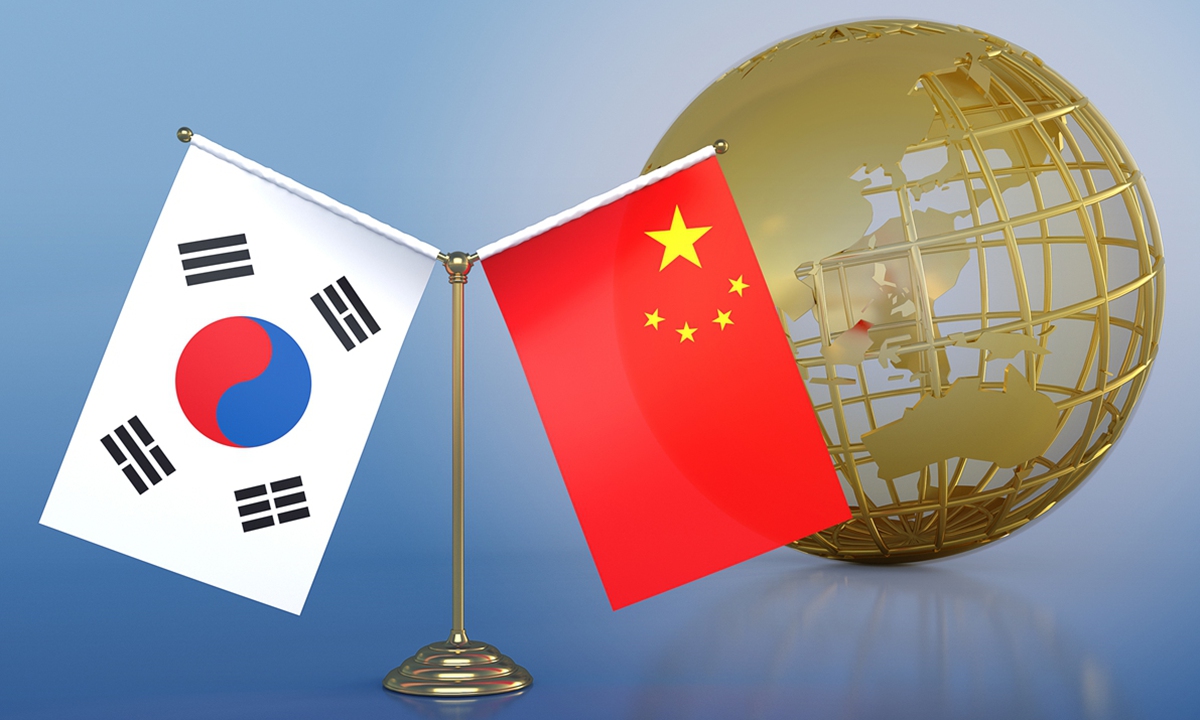
China South Korea Photo:VCG
For the next three decades, China and South Korea should conclude beneficial experience and grasp overall stable development of bilateral ties, Chinese State Councilor and Foreign Minister Wang Yi said in a meeting with visiting South Korean Foreign Minister Park Jin in Qingdao, East China's Shandong Province on Tuesday. Wang urged the two countries to uphold independence and autonomy and avoid being influenced by outside forces, according to the website of China's Ministry of Foreign Affairs.
Park's visit comes at a key juncture of bilateral relations between China and South Korea, just as Washington ups the ante to pressure Seoul to take a hard stance toward China on issues such as THAAD anti-missile unit and joining the "Chip 4" - an alliance created by the US that some believe aims to set up a semiconductor barrier against the Chinese mainland. It is also two weeks before the 30th anniversary, on August 24, of the establishment of China-South Korean diplomatic ties.
Experts said that the meeting between Wang and Park was held amid a positive atmosphere after South Korean President Yoon Suk-yeol snubbed US House Speaker Nancy Pelosi following the provocative trip she made to the island of Taiwan, and South Korea also made a formal statement of support for the one-China principle in this regard.
Although there are thorny issues standing in the way, Park's visit signals South Korea's sincerity to exchange views which would yield positive results, said experts.
After three decades, bilateral ties should be more mature, independent and stable. China and South Korea are neighbors that share common security, and are partners in need, said Wang, who also stressed sticking to opening-up, win-win principles, maintaining smooth supply chains, and not interfering in others' internal affairs, according to the handout from China's Ministry of Foreign Affairs.
Park said South Korea is willing to conduct cooperation with mutual respect, equality and mutual benefit, and mutual trust enhancement, to make the relationship between the two countries more mature and healthy.
Park's visit marks the first high-level South Korean official to travel to China since President Yoon took office in May.
Da Zhigang, director of the Institute of Northeast Asian Studies at Heilongjiang Provincial Academy of Social Sciences, told the Global Times that Wang's remarks are a reminder for Seoul to stick to its own independent diplomacy when faced with Washington's increasing pressure.
From South Korea's participation in NATO meetings and the Indo-Pacific Economic Framework, we can see that South Korea cannot completely shake off the influence of the US, yet it has to shy away from provoking China, one of its most important neighbors and trade partners, Da said.
Experts said that as the THAAD issue remains the biggest challenge for bilateral ties, the Yoon administration should understand the seriousness of the THAAD issue, as it had sparked outrage among Chinese people and pushed bilateral relations to their lowest in decades. How to deal with the THAAD issue poses a big challenge for Yoon's political wisdom, said experts.
China urged the Yoon administration to keep the preceding Moon Jae-in administration's "Three No's" policy on the THAAD issue and act prudently on major issues concerning its neighbors' security, after Park said at the National Assembly in July that the "Three No's" policy is not a commitment to China.
However, Park's visit signals that the Yoon administration attaches importance to Seoul-Beijing ties, since the Yoon administration has been playing down the previous tough attitude toward China that dominated his presidential campaign and the very beginning of his tenure, Lü Chao, an expert on Korean Peninsula issues at the Liaoning Academy of Social Sciences, told the Global Times on Tuesday.
South Korea has reportedly expressed its intent on taking part in a preliminary meeting for Chip 4, South Korean news agency Yonhap reported on Tuesday. The meeting is expected to be held around early September, before South Korea decides formally whether to join the initiative.
Seoul has previously rejected characterizations of the group as an exclusive "alliance" and described it as a cooperation dialogue on semiconductor supply chains, the Korea Herald reported.
It reflects a basic attitude of the South Korean government, that is, it will not easily succumb to the pressure of the US, and can even bargain with the US on some issues involving its core interests, Lü said. He noted that it is clear that South Korea is unwilling to take sides between two superpowers and also wants to maintain good relations with China, especially in regional stability and the security of supply chains.
South Korea joined the chip alliance to a large extent in response to the coercion and pressure of the US. Cooperation and trade order between China and South Korea were stable and smooth before the US intimidated regional countries to contain China, the expert explained.
Also high on the agenda is boosting cultural and people-to-people exchanges as well as restarting K-pop exports, Park said. "I would like to discuss ways to promote communication and exchanges between the younger generations who will carry the future of both countries," Park said on Twitter on Tuesday before he met Wang.
At his inauguration on August 1, South Korea's new ambassador to China, Chung Jae-ho, also said that the biggest obstacle in bilateral relations are the growing negative opinions harbored by the two peoples, and if this problem is not reined in, bilateral ties cannot be guaranteed.
Lü also highlighted that the people of both sides have a solid foundation for cultural exchanges and have a deep understanding of each other's countries and cultures, which means that China and South Korea have very optimistic prospects for people-to-people exchanges in the future. One of the best ways is to strengthen cultural exchanges between the two peoples, especially in music, movies and TV dramas, which are deeply involved in the lives of ordinary people, Lü noted.




